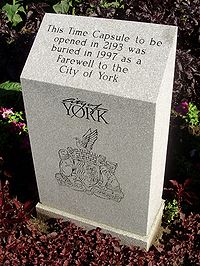City of York, ON
| York, Toronto | |
|---|---|
| Dissolved municipality | |

This time capsule outside the York Civic Centre is intended to be sealed for 196 years. It also depicts the city's logo and coat of arms, which contains the city's motto in Latin. The other former municipalities of Metropolitan Toronto all have mottoes in English.
|
|
| Motto(s): E singulis communitas (Latin for "From individuals, a community") | |
 Location of York (red), as compared with the rest of Toronto. |
|
| Country |
|
| Province |
|
| Municipality |
|
| Incorporated | 1793 (township) 1 January 1967 (borough) June 1983 (city) |
| Changed Region | 1954 |
| Amalgamated | 1 January 1998 into Toronto |
| Government | |
| • Councillors | Josh Colle, Joe Mihevc, Frances Nunziata, Cesar Palacio |
| • MPs | Carolyn Bennett, Julie Dzerowicz, Marco Mendicino, Ahmed Hussen |
| • MPPs | Laura Albanese, Mike Colle, Eric Hoskins, Cristina Martins |
| Area | |
| • Total | 23.18 km2 (8.95 sq mi) |
| Population (2016) | |
| • Total | 145,662 |
| • Density | 6,284/km2 (16,280/sq mi) |
| Time zone | EST (UTC-5) |
| • Summer (DST) | EDT (UTC-4) |
| Area code(s) | 416, 647 |
York is a former municipality within the current city of Toronto, Ontario, Canada. It is located northwest of Old Toronto, southwest of North York and east of Etobicoke, where it is bounded by the Humber River. As a separate city, it was one of six municipalities that amalgamated in 1998 to form the current city of Toronto. The City of York was created by the amalgamation of several villages, including the present-day neighbourhoods of Lambton Mills and Weston.
York Township was incorporated by Canada West in 1850 (Canada West later became Ontario in 1867, due to Confederation), bounded in the west by the Humber River, in the east by what would become Victoria Park Avenue, and in the north by what would become Steeles Avenue. Etobicoke Township and Scarborough Township were located west and east, respectively, while the townships of Vaughan and Markham bordered on the north.
York Township was home to one of the original Black communities in the Toronto area, which was populated by many African American fugitive slaves. By 1861, the township had the second-largest Black population in the Toronto area, after St. John's Ward, most of whom lived in York Township West (located west of Yonge Street and north of Bloor Street). The legacy of York's original Black community continues today; as of the 2011 Census, 15.9% of York's population is Black, the largest percentage of all six former boroughs.
...
Wikipedia
